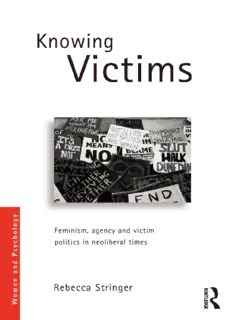
Knowing Victims: Feminism, Agency and Victim Politics in Neoliberal Times PDF
Preview Knowing Victims: Feminism, Agency and Victim Politics in Neoliberal Times
KNOWING VICTIMS Knowing Victimsexplores the theme of victimhood in contemporary feminism and politics. It focuses on popular and scholarly constructions of feminism as ‘victim feminism’ – an ideology of passive victimhood that denies women’s agency – and provides the first comprehensive analysis of the debate about this ideology which has unfolded among feminists since the 1980s. The book critically examines a concerted movement away from the language ofvictimhood across a wide array of discourses, and the neoliberal replacement of the concept of structural oppression with the concept of personal responsibility. In derogating the notion of ‘victim’, neoliberalism promotes a conception of victimization as subjective rather than social, a state of mind rather than a worldly situation. As a result, victims of poverty, inequality, discrimination and violence are discursively constructed as the authors of their own suffering, or as genuine victims of incomprehensible crime. Drawing upon Nietzsche, Lyotard, rape crisis feminism and feminist philosophy, Rebecca Stringer situates feminist politicizations of rape, interpersonal violence, economic inequality and welfare reform as key sites of resistance to the victim- blaming logic of neoliberalism. She suggests that although recent feminist critiques of ‘victim feminism’ have critically diagnosed the anti-victim movement, they have not positively defended victim politics. Stringer argues that a conception of the victim as an agentic bearer of knowledge, and an understanding of resentment as a generative force for social change, provides a potent counter to the negative construction of victimhood characteristic of the neoliberal era. This accessible and insightful analysis of feminism, neoliberalism and the social construction of victimhood will be of great interest to researchers and students in the disciplines of gender and women’s studies, psychology, sociology, politics and philosophy. Rebecca Stringer is Senior Lecturer in Gender Studies at the University of Otago in Dunedin, New Zealand, and is co-editor, with Hilary Radner, of Feminism at the Movies: Understanding Gender in Contemporary Popular Cinema (Routledge, 2011). WOMEN AND PSYCHOLOGY Series Editor: Jane Ussher School of Psychology, University of Western Sydney This series brings together current theory and research on women and psychology. Drawing on scholarship from a number of different areas of psychology, it bridges the gap between abstract research and the reality of women’s lives by integrating theory and practice, research and policy. Each book addresses a ‘cutting edge’ issue of research, covering topics such as postnatal depression and eating disorders, and addressing a wide range of theories and methodologies. The series provides accessible and concise accounts of key issues in the study of women and psychology, and clearly demonstrates the centrality of psychology debates within women’s studies or feminism. Other titles in this series: THE THIN WOMAN Helen Malson THE MENSTRUAL CYCLE Anne E. Walker POST-NATAL DEPRESSION Paula Nicolson RE-THINKING ABORTION Mary Boyle WOMAN AND AGING Linda R. Gannon BEING MARRIED, DOING GENDER Caroline Dryden UNDERSTANDING DEPRESSION Janet M. Stoppard FEMININITY AND THE PHYSICALLY ACTIVE WOMAN Precilla Y. L. Choi GENDER, LANGUAGE AND DISCOURSE Anne Weatherall THE SCIENCE/FICTION OF SEX Annie Potts THE PSYCHOLOGICAL DEVELOPMENT OF GIRLS AND WOMEN Sheila Greene JUST SEX? Nicola Gavey WOMAN’S RELATIONSHIP WITH HERSELF Helen O’Grady GENDER TALK Susan A. Speer BEAUTY AND MISOGYNY Sheila Jeffreys BODY WORK Sylvia K. Blood MANAGING THE MONSTROUS FEMININE Jane M. Ussher THE CAPACITY TO CARE Wendy Hollway SANCTIONING PREGNANCY Harriet Gross and Helen Pattison ACCOUNTING FOR RAPE Irina Anderson and Kathy Doherty THE SINGLE WOMAN Jill Reynolds MATERNAL ENCOUNTERS Lisa Baraitser WOMEN AND DEPRESSION Michelle N. Lafrance UNDERSTANDING THE EFFECTS OF CHILD SEXUAL ABUSE Sam Warner THE GENDERED UNCONSCIOUS Louise Gyler HARD KNOCKS Janice Haaken DOMESTIC VIOLENCE AND PSYCHOLOGY Paula Nicolson ‘ADOLESCENCE’, PREGNANCY AND ABORTION Catriona I. Macleod THE MADNESS OF WOMEN Jane M. Ussher FAT LIVES Irmgard Tischner WOMEN VOICING RESISTANCE Suzanne McKenzie-Mohr and Michelle N. Lafrance KNOWING VICTIMS Rebecca Stringer KNOWING VICTIMS Feminism, agency and victim politics in neoliberal times Rebecca Stringer Routledge Taylor & Francis Group LONDON AND NEW YORK First published 2014 by Routledge 27 Church Road, Hove, East Sussex BN3 2FA and by Routledge 711 Third Avenue, New York, NY 10017 Routledge is an imprint of the Taylor & Francis Group, an informa business © 2014 Routledge The right of Rebecca Stringer to be identified as author of this work has been asserted by her in accordance with sections 77 and 78 of the Copyright, Designs and Patents Act 1988. All rights reserved. No part of this book may be reprinted or reproduced or utilized in any form or by any electronic, mechanical, or other means, now known or hereafter invented, including photocopying and recording, or in any information storage or retrieval system, without permission in writing from the publishers. Trademark notice: Product or corporate names may be trademarks or registered trademarks, and are used only for identification and explanation without intent to infringe. British Library Cataloguing in Publication Data A catalogue record for this book is available from the British Library Library of Congress Cataloging in Publication Data Stringer, Rebecca. Knowing victims : feminism, agency and victim politics in neoliberal times / Rebecca Stringer. pages cm Includes bibliographical references and index. 1. Women–Crimes against. 2. Women–Violence against. 3. Victims–Political aspects. 4. Feminism. I. Title. HV6250.4.W65S79253 2014 362.88082–dc23 2014002346 ISBN: 978-0-415-63492-2 (hbk) ISBN: 978-0-415-64333-7 (pbk) ISBN: 978-1-315-88012-9 (ebk) Typeset in Times by Keystroke, Station Road, Codsall, Wolverhampton For Dylan This page intentionally left blank CONTENTS Acknowledgements xi Introduction: feminism and victim politics in neoliberal times 1 1 Victims left, right and centre: constructing ‘victim feminism’ 17 2 Vulnerability after wounding: feminism, rape law and the differend 57 3 Injury incorporated? Feminism and the politics ofressentiment 87 4 Rethinking ressentiment: Nietzsche and the victim subject in neoliberal times 131 Conclusion: feminism after neoliberal victim theory 157 Bibliography 163 Index 177 ix
Description: